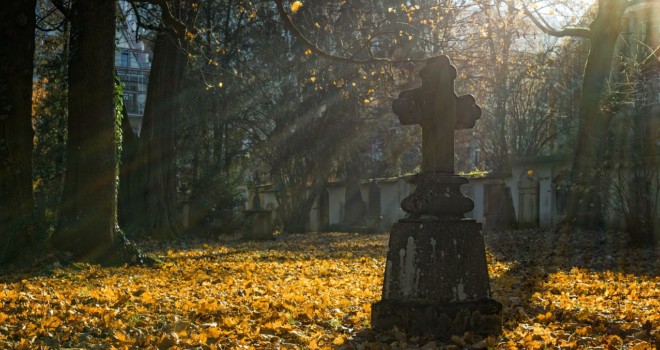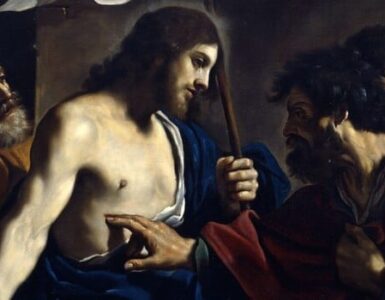Thomas Nashe (1567-1601) lived a short but busy life as an Elizabethan poet, playwright, novelist, satirist, and pamphleteer. He died during plague in England at the age of 34. Nashe had sought to avoid the scourge by leaving London in the summer for the country. His passing is surrounded by mystery. The time and location of his death are unknown and whether the plague, poison, or a stroke caused his demise remains open to speculation. What we do know is that he authored a poem by the curious title, “A Litany in a Time of Plague,” which gives us a sense of how an important poet feels when struggling to keep alive during a pandemic.
With little defense against the plague in the 16th century, Nashe finds solace in the notion that “Heaven is our heritage, Earth but a player’s stage”. The ninth stanza aptly captures the essence of his poetic effort: “Gold cannot buy you health; Physic himself must fade. All things to end are made, The plague full swift goes by; I am sick, I must die. Lord have mercy on us.”
The poem reiterates an eternal theme. We, all of us, are mortal. We leave the world as we entered it—with nothing. But with God’s mercy, we shall gain a better life. The “Litany” is as relevant today as it was more than 400 years ago. “A thing of beauty is a joy forever,” wrote John Keats. We may also say that a statement of truth is a truth forever.
The same theme was reiterating earlier by the Scottish poet, Robert Blair (1699-1746). “The task be mine,” he wrote, “To paint the gloomy horrors of the tomb; Th’ appointed place of rendezvous, where all These travellers meet.”
We journey to the pen of John Dryden (1631-1700). The epic opening lines of his poem “Mac Flecknoe” read as follows: “All human things are subject to decay; and when fate summons, monarchs must obey.” Death does not discriminate. Neither wealth nor earthly power can keep us from the grave. All this is undeniable, though decidedly gloomy.
More hopeful is the view of Thomas Gray (1716-1771), contained in his much loved poem, “Elegy Written in a Country Churchyard”. The following stanza echoes the sentiments of both Thomas Nashe as well as John Dryden: “The boast of heraldry, the pomp of pow’r, And all that beauty, all that wealth e’er gave, Awaits alike th’ inevitable hour. The paths of glory lead but to the grave.” The mood of the poem is, presumably, taken from the environment in which Gray found his inspiration — a graveyard. The suggestion is that that same mood surrounds all of us, if not in the form of a plague, then in the simple fact that we are all mortal. If the plague does not get us, our mortality will.
Is it possible, we may ask, to speak of our mortality in a more light-hearted vein? Arthur Guiterman (1871-1943) was an American poet, best known for his humorous poetry, including, “Ode to the Amoeba,” where he writes: “The First Amoeba strangely splendid, From whom we’re all of us descended. . . . Columbus, Shakespeare, Darwin, Shelley / Derived from that same bit of jelly.” Perhaps his most famous poem is “On the Vanity of earthly Greatness.” It has the brevity that resonates with Shakespeare’s “Out, out, brief candle!” and therefore may be presented in its entirety: “The tusks that clashed in mighty brawls / Of mastodons, are billiard balls. The sword of Charlemagne the Just / Is ferric oxide known as rust. The grizzly bear whose potent hug / Was feared by all, is now a rug. Great Caesar’s bust is on the shelf / And I don’t feel so well myself.”
Finally, we come to that most congenial bard and scholar, Henry Wadsworth Longfellow. In “A Psalm of Life,” he reminds us that “Life is real! Life is earnest! And the grave is not its goal. Dust thou art, to dust returnest, was not spoken of the soul.”
Yes, we are dust, as Scripture tells us, but, as Shakespeare adds, we are the “quintessence of dust”. As dust, we are easily blown away by the wind, especially if the wind is carrying the coronavirus. But as the quintessence, or highest order of dust, we are immortal. The great paradox of life: immortality sheltered with a frame of mortality.
Poets give us hope, for they can sing their song in the midst of calamity. Art is the attempt to open the gates of heaven and convince the world that the vision it offers is the destiny we seek. The current pandemic is not exceptional.
Our dusty mortality is a plague that is always with us, seared indelibly into our flesh as it is. Neither youth, nor fame, nor fortune, nor power are barriers against death. To live means to value each moment knowing that death awaits us. As the inimitable G. K. Chesterton tells us, there are two ideas of death that represent two types of tragedy.
“There is the tragedy that is founded on the worthlessness of life; and there is the deeper tragedy that is founded on the worth of it. The one sort of sadness says that life is so short that it can hardly matter; the other that life is so short that it matters for ever.”
However short life may be each moment should be cherished. This is the lesson the pandemic offers us. It is the most stern of all teachers. We, then, should be the most docile of all students.
✠
image: Autumn Leaves in a Cemetery with a cross illuminated by sun by mali maeder / pexels.













